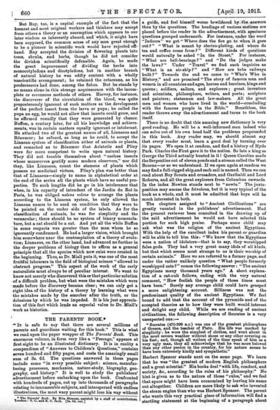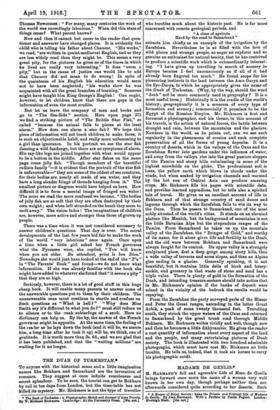THE PARENTS' BOOK.*
." IT is safe to say that there are several millions of parents and guardians waiting for this book." This is what we read upon the paper wrapper of The Parents' Book. This enormous volume, in form very like a "Peerage," appears at first sight to be an illustrated dictionary. It is in reality a compendium of "Answers to Children's Questions," contains seven hundred and fifty pages, and costs the amazingly small sum of 3s. 6d. The questions answered in these pages include some "in every possible subject : science, manufac- turing processes, mechanics, nature-study, biography, geo. graphy, and history." It is well to study the publishers' advertisement before embarking upon the book. Confronted with hundreds of pages, cut up into thousands of paragraphs relating to innumerable subjects, and interspersed with endless illustrations, the most wary parent might lose his way without • The Parents' Book. By Rita Strauss, assisted by a staff of contributors. London T. C. and E. C. Jack. Ds. 6d. net.]
a guide, and feel himself worse bewildered by the answers than by the questions. The headings of various sections are placed before the reader in the advertisement, with specimen questions grouped underneath. For instance, under the word "Indoors" we get "Where does the fire go to when it goes out ?" "What is meant by electro-plating„ and where do tea and coffee come from F" Different kinds of questions would naturally be asked "In the Street." For instance, " What are ball-bearings ? " and "Do the judges make the laws ?" Under "Travel" we find such inquiries as "What is an air-ship ? " and "How are tube railways built F" Towards the end we come to "Who's Who in History," and are promised "The story of famous men and women in all countries and ages, heroes and heroines, kings and queens ; soldiers, sailors, and explorers ; great inventors and scientists, philosophers, writers, and poets; sculptors and painters; statesmen and law-makers. All the great men and women who have lived in the world—concluding with the famous people in the Bible." Breathless, the reader throws away the adve:tisement and turns to the book itself.
There is no doubt that this amazing new dictionary is very good reading. He will be a well-informed man indeed who can solve out of his own head half the problems propounded in this book. Any reader may, we should almost say that every reader must, learn a good deal by turning over its pages. We open it at random, and find a history of Hyde Park. Charles the First gave it to the nation. So late a king as George the Third actually bunted in it ! Queen Caroline made the Serpentine out of eleven ponds and a stream called the West Bourne—or BO we understand. If we open again at random we may find a full-rigged ship,and each sail is named. Then we can read about Boy Scouts and crusaders, and Garibaldi and Lord Roberts, and all the great explorers from Columbus onwards In the index Newton stands next to "newts." The juxta- position may amuse the frivolous, but it is very typical of the book as a whole, and it must be admitted that boys will be much interested in both.
The chapters assigned to "Ancient Civilizations" are greatly vaunted in the publishers' advertisement. Had the present reviewer been consulted in the drawing up of the said advertisement he would not have selected this portion for such high praise. Perhaps some child may ask what was the religion of the ancient Egyptians. With the help of the excellent index his parent or guardian will be able to tell him this: "We know that the Egyptians were a nation of idolators—that is to say, they worshipped false gods. They had a very great many idols of all kinds, but that which seems most strange to us is their worship of certain animals." Here we are referred to a former page, and under the rather unlikely question "What people formerly worshipped cats ?" comes the following answer : "The ancient Egyptians many thousand years ago." A short explana- tion of a cat-cult follows, ending with the very natural comment, "How foolish the people of those times must have been." Surely any average child could have grasped a more enlightening account. Silliness was not the predominant quality of the ancient Egyptians. We feel bound to add that the account of the pyramids and of the
accepted theories as to how they were built would interest and delight any child. While we are reading of ancient
civilizations, the following description of Socrates is a very unexpected one :—
"Socrates (470-399 B.c.) was one of the greatest philosophers of Greece, and the teacher of Plato. His life was marked by simplicity : he wore the simplest of clothes, and went about in the most severe weather without shoes or any other covering on his feet ; and, though all writers of the time speak of him as a very ugly man, they all acknowledge that he was more beloved than any other person in the country, for his nature seems to have been extremely kindly and sympathetic."
Herbert Spencer stands next on the same page. We learn that he was "the greatest of modern English philosophers and a great scientist." His books deal "with life, conduct, and society, &c., according to the rules of his philosophy." No hint is given as to the nature of those "rules," and we feel that space might have been economized by leaving his name out altogether. Children are more likely to ask who invented the steam engine than who was Herbert Spencer. The parent who wants this very practical piece of information will find a startling statement at the beginning of a paragraph about Thomas Newcomen "For many, many centuries the work of the world was exceedingly laborious." When did this state of things cease ? What parent knows Now and then it cannot but occur to the reader that ques- tioner and answerer have changed places. It is evidently the child who is telling his father about Chaucer. "His works," we read, "are written in quaint mediaeval English, and so they -are less widely read than they might be. This seems a very great pity, for the pictures he gives us of the times in which he lived are really very interesting." It does "seem a pity," but in the cause of justice one would like to add that Chaucer did not mean to do wrong! In spite of the quaintness of his English his education would seem not to have been neglected ; "his works show he was acquainted with all the great branches of learning." Someone /night have taught him King George's English ! One ought, however, to let children know that there are gaps in the information of even the most erudite.
But let us leave the company of men and books and go to "The Sea-Side" section. Here upon page 375 we find a striking picture of "The Brittle Star Fish," so called "because the animal falls to pieces at the least alarm." How does one alarm a star fish ? We hope this piece of information will not teach children to make faces, it is such an objectionable habit, and really more unbecoming to a girl than ignorance. In his portrait we see the star fish dancing a wild fandango, but there are no symptoms of alarm. His ray-like legs are joined together with what would appear to be a button in the middle. After star fishes on the same page come jelly fish. "Though members of the beautiful radiate family "—it is evident that the portrait of the star fish is unfavourable—" they are some of the oddest of sea creatures, for their bodies are nearly all made of sea water, and they have a long slender fringe of threads hanging from it." The smallest picture or diagram would have helped us here. How difficult it is to form a mental image of fringed sea water ! The more we read the more confused we become. "The bodies of jelly fish are so soft that they are often destroyed by their own weight ; and when left stranded on the beach they seem to melt away." The vision fades ! The imaginations of children are, however, more active and stronger than those of grown-up people.
There was a time when it was not considered necessary to answer children's questions. That day is over. The moral developments of the last few years bid fair to make the work of the world "very laborious" once again. Once upon a time when a little girl asked her French governess what the Pyrenees were, she replied, "You will know -when you are older. En attendant, priez le bon .Dieu." Nowadays she would just have looked at the end of the "P's" in "The Parents' Book" and found—we do not know what information. If she was already familiar with the book she might have added to whatever she found that " it seems a pity" that they are so high.
Seriously, however, there is a lot of good stuff in this huge cheap book. It will enable many parents to answer some of the answerable questions put to them by their children. The unanswerable ones must continue to startle and confuse us. Such questions as "What is hell ? " "Why does Miss Smith say it's different to what you do P" must still reduce us to silence or to the weak subterfuge of a snub. Here no dictionary can help us. By the by, the answer of the French governsss might be apposite. At the same time, the feeling of the ea ler as he lays down the book (and it will be, we assure him, a long time after he took it up) will be, we think, one of gratitude. It is worth more than 3s. 6d., and we are glad that it has been published, and that the "waiting millions" are waiting for it no longer.











































 Previous page
Previous page